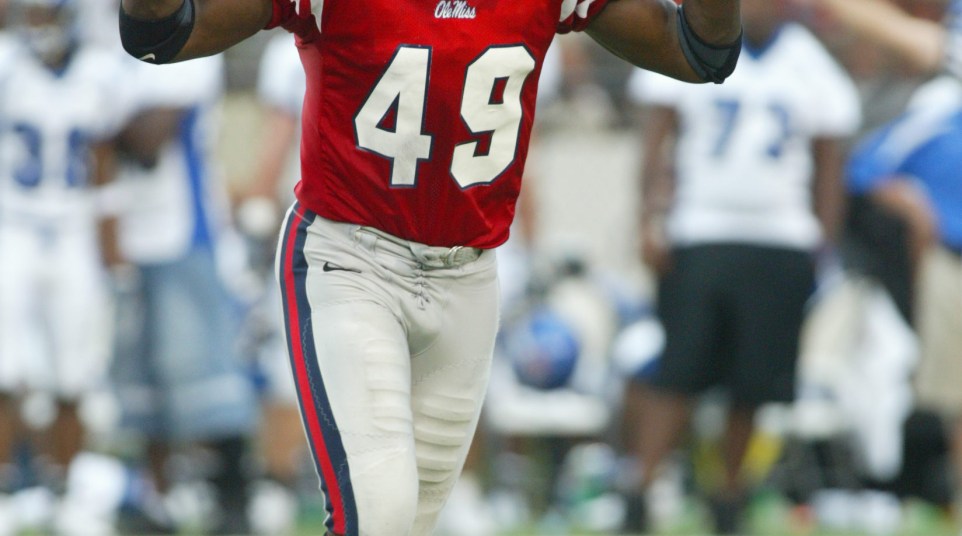
Ole Miss great Patrick Willis should be a lock to get into the College Football Hall of Fame
They say that form tackling is a lost art.
Many believe that kids aren’t being taught the skill anymore, and as a result, too many college football players struggle with one of the simplest aspects of the game. To some, poor form tackling is the reason that football isn’t the same game it was 20 or 30 years ago.
But I bet nobody ever said that when Patrick Willis stepped on to a football field.
Between the time when he was a lightly-recruited kid from Tennessee to his immediate emergence as an All-Pro linebacker in the NFL, Willis became a tackling machine at Ole Miss. Few could lay the wood like he could.
I imagine there were few things more terrifying for an opposing ball-carrier than seeing No. 49 in red and navy coming untouched through the middle.
We can go back and watch old highlights of Willis all day (it’s an easy way to kill an afternoon). The tape doesn’t lie, nor does Willis’s résumé. He was a two-time first-team All-American, a Butkus Award winner and the 2006 SEC Defensive Player of the Year. Add it all up, and what do you get?
A College Football Hall of Fame inductee.
Willis is one of 75 players on the ballot to get into the exclusive club in 2018. It’s his first year on the ballot, and if the National Football Foundation votes as it should, it’ll be Willis’s last.
Only one Ole Miss player in the 21st century has been inducted into the College Football Hall of Fame. That was Wesley Walls, who was a star tight end for the Rebels from 1985-88. He was on the ballot for five years before his selection.
All signs point to Willis being a different story. And make no mistake, it’s a big deal.
Ole Miss actually told me that they nominated Willis two years ago. That was two years before he even became eligible to be on the ballot. That says a lot about what he meant to that program.
From a national perspective, Willis’s accomplishments might’ve been a bit overlooked. After all, Ole Miss never won more than four games in his final three years in Oxford. When Willis put together his All-America season in 2006 — he racked up an SEC-best 137 tackles — the Rebels had the worst offense in the SEC. Any voter that passes on Willis for the lack of team success would be foolish.
And for the record, Willis did play in all 13 games as a true freshman on the 2003 Ole Miss team that finished No. 13 nationally with Eli Manning under center. That same year, Willis earned the Scholar-Athlete Award from the Ole Miss Chapter of the National Football Foundation and College Hall of Fame.
When you consider what he came from, that’s a helluva accomplishment in itself.
As a teenager in Bruceton, Tennessee, Willis escaped poverty and an alcoholic father, and took his siblings to live with his high school basketball coach. Though Willis was a three-sport star, the football field was where he shined brightest. As a senior, he was voted Mr. Football in Tennessee for dominating both as a linebacker (163 tackles, 36 tackles for loss) and as a running back (194 carries for 2,167 yards and 30 touchdowns).
For some reason, though, Willis wasn’t flooded with big-time offers. Scout.com listed him as a two-star recruit while 247sports ranked him the No. 60 inside linebacker in the country:

Fourteen years later, Willis seems like a lock to not only get into the College Football Hall of Fame, but the Pro Football Hall of Fame as well. He made the Pro Bowl every year with the exception of his final, injury-shortened season in 2014. That should’ve only solidified what many in Oxford already knew.
Few played the linebacker position quite as well as Willis did.
The numbers show why Willis’s College Football Hall of Fame enshrinement is inevitable. Former Texas A&M linebacker Dat Nguyen was just inducted into the 2017 class. His accomplishments were comparable to Willis’s.
[table “” not found /]
Willis has never been about awards or accolades. He developed a reputation as the quiet, steady guy who let his production do the talking. There are plenty of NFL fans who wish Willis could’ve played well into his 30s instead of having his career end because of injuries at age 29.
There are also plenty of Ole Miss fans who wish Willis had one more year of eligibility. Well, the Rebels probably can’t ask for much more than they got from him. Willis could’ve easily left early for the NFL after his junior season. Instead, Willis returned for his senior season in hopes of becoming one of the best linebackers in Ole Miss history. Needless to say, he did that and then some.
Willis’s next task is earning a place among the best linebackers to ever play college football. If and when he gets inducted into the College Football Hall of Fame, he’ll be the first Ole Miss linebacker to do so.
In case you didn’t notice, Willis is well-versed in the art of breaking down barriers.
